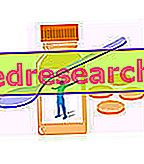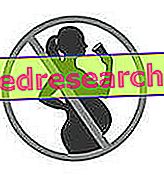Definition
The term "botulism" refers to a serious intoxication sustained by Botox, an anaerobic bacterium that can contaminate food; we are talking about a very serious intoxication, which can seriously jeopardize the patient's life. Botox is the most toxic natural "substance": from here we can understand the danger of a disease supported by this pathogen.
Causes
Contrary to what one might believe, it is not the bacterium itself that triggers the disease, rather the toxins it releases into food. The transmission of Botox can occur by taking infected food (especially fish and canned meats, salami and preserves in oil), or through contact with the blood of a sick person (eg infected syringes). Botox is not a contagious disease.
Symptoms
Botox poisoning shows the first symptoms after 2-8 days from ingestion of toxins: diarrhea, severe abdominal pain, nausea and vomiting are the first signs with which the disease is felt. Subsequently, the clinical picture worsens and the victim complains of visual changes, difficulty swallowing and talking, dry mouth and respiratory tract. Any uncontrolled degeneration of botulism can induce death by respiratory paralysis and asphyxia.
Botox in foods
Information on Botulism - Drugs for the Treatment of Botulinum Intoxication is not intended to replace the direct relationship between health professional and patient. Always consult your doctor and / or specialist before taking Botulism - Drugs for the Treatment of Botulinum Intoxication.
drugs
Prevention first of all: botulism is a serious and dangerous food poisoning which, as analyzed, can be deadly. Botox is an anaerobic microorganism, whose presence in canned foods or canned foods, unfortunately, cannot be perceived either by taste or smell. However, the Botox is sensitive to oxygen, acidity and heat, so it is rather simple to eradicate it: from what has been said it follows that boiling or in any case a heat treatment is sufficient to guarantee the removal of the beating. Compliance with some simple behavioral and hygienic rules during food preparation is essential to guarantee the healthiness of food.
The food industry has mobilized on the front of botulism prevention: the use of specific food preservatives, in fact, is essential to remove the risk of Botox development / proliferation.
But what to do and how to proceed to cure botulism? Is there a cure?
The chances of survival from botulism increase as a function of the immediacy with which relief is used: the best antidote is represented by an antitoxin (or botulinum serum), associated with artificial assisted respiration. The administration of laxatives and vomiting stimulating drugs (emetics) may constitute a further therapeutic practice to speed up the time to remove the toxin. Often, it is also advised to follow an antibiotic therapy with penicillin.
Botulinum serum ( botulinum antitoxin): the drug works by binding to the botulinum toxin (still circulating in the blood stream), preventing nerve damage; the antitoxin, if given early, can reverse any damage already developed by the Botox. It is not indicated for newborns suffering from botulism, since the antitoxin, in this case, does not interact with the pathogens in the digestive tract of the child; for children the antitoxin is replaced with another drug called " Botulism Immune Globulin"
BotulismImmune Globulin : for the treatment of botulinum intoxication in children who have not yet reached the age of one, it is recommended to take 2ml / kg (100 mg / kg) of intravenous drug (single dose) as soon as it is diagnosis has been ascertained. For injections, add 2 ml of sterile water to the 100 mg vial; then administer 50 mg of solution. The infusion should take place within 2 hours of the onset of symptoms, by slow intravenous injection; indicatively, administer 0.5 mg / kg / hour (corresponding to 25mg / kg / hour). If side effects do not occur after 15 minutes, the infusion rate can be increased to 1 mg / kg / hour (50 mg / kg / hour). The therapeutic effect of the drug should appear within 2 hours of the initial administration.
If botulism was contracted from a wound, it is possible that the patient will undergo surgical removal of the contaminated tissue.
Antibiotics : to be administered exclusively in the event of an ascertained intestinal complication. The drug most commonly used for this purpose is penicillin.
- Penicillin G (eg Benzil B, Penicillin G): for Botox wounds, it is recommended to take it at dosages of 3-4 million IU every 4 hours, intravenously for 1-2 weeks. After the first improvement in symptoms, it is recommended to take the potassium penicillin V variant, at a dose of 250-500 mg orally. Consult your doctor before taking the antibiotic.
Laxatives : indicated to promote and speed up the elimination of botulinum toxin. Here are some examples:
- Bisacodyl (eg. Dulcolax, Stixenil, Alaxa): take 5-10 mg of anthraquinone drug in the evening (effect in 10-12 hours); alternatively, take 5 mg of medication in the morning in the form of suppositories (effect in 20-60 minutes).
- Glycerin (eg. Glycerine San Pellegrino suppositories): in the form of bladders, take 5.6 grams of drug by rectal route; alternatively, insert a 2-3 gram suppository.
- Lactulose (eg Duphalac, Epalfen, Normase): it is recommended to start the treatment to facilitate the elimination of botulinum toxins with a rather low posology (15 ml of solution at 62-74%), twice a day. The dose should be modified according to the severity of the condition.
- Magnesium hydroxide (eg Magnesia, Maalox): these are saline laxatives, used when rapid bowel emptying is required, as in the case of botulinum intoxication. Take the drug preferably in the morning: usually a teaspoon of product with plenty of water is needed (the drug is available as a powder for oral suspension of 90 grams of active on 100 grams of product). The excessive use can give colic.
Emetic drugs, stimulating vomiting, can help to facilitate the expulsion of botulinum toxins contained in the stomach. For example, ipecacuanana (eg Ipecac FN) at high doses: the therapeutic effect generally occurs 15-30 minutes after intake.



